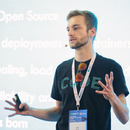Workshops
Java with Ultra Fast Startup and Remote JIT Compilation
Java starting too slowly for you? Amazed that your program has to JIT compile the same old methods every time you run it, consuming memory and CPU cycles that you’ve got to pay for? It doesn’t have to be that way! With Eclipse OpenJ9 built into the Semeru Runtimes JDK, you can start your Linux-based Java servers and then save them to disk. When you need another instance, don’t start it from scratch! Simply restore it from disk to avoid almost all that startup work to get your server handling requests in just a couple hundred milliseconds! And that powerful JIT compiler can be easily configured to run as a remote service so that your applications aren’t disrupted by those extra CPU cycles and memory use. In this workshop, we’ll teach you a bit more about these amazing technologies and then let you try them out yourselves with some simple Liberty-based servers running on the OpenShift Container Platform. You’ll see firsthand why these technologies are being used in production today to provide incredibly elastic and cost-effective servers for Java workloads. You know you’re curious! Bring your questions and an open mind and let us show you how you too can overcome Java’s traditional overheads without restricting the use of any Java language features!.
| Register for free Reservate seat for 19.99€ + VAT | Get Your Seat |

Mark Stoodley
Chief Architect for IBM Java
Transforming Code with OpenRewrite and Refaster
Any project has its share of code quality issues. And if you think you don't, just wait a while, as existing code patterns and libraries quickly become the old way of doing things. You need to constantly modernize your codebase to keep up, and we’re here to explore tooling that helps you do so.
From a shared passion for code quality, Rick & Tim each arrived at different solutions. Rick is involved with Error Prone Support at Picnic, while Tim works on OpenRewrite at Moderne. Both allow you to manipulate your code to keep things maintainable, but when to use which tool?
In this workshop we’ll explore the relative merits of each tool, as we strive to get rid of common code quality issues affecting codebases. We’ll dive into how you define the changes to make, how to run these code changes, and how to gradually change code and culture across an organization. Walk away with directly applicable fixes, and the toolset and skills to write your own code transformations.
| Register for free Reservate seat for 19.99€ + VAT | Get Your Seat |

Tim te Beek
Staff software engineer at Moderne

Rick Ossendrijver
Software Engineer in Picnic's Java Platform team
EclipseStore - Getting Started & Best Practice
EclipseStore is a fundamentally new persistence framework for storing complex Java object graphs, subgraphs, and single objects. In the other direction, it enables loading complex object graphs, subgraphs as well as single objects dynamically and updating the object graph in RAM. With EclipseStore database data models become meaningless for Java developers. No more expensive mappings. No more data-type conversion. No more specific query language. Only one data model: Your Java classes without any dependencies (POJOs). No more complex caching layer. No more inconvenient object copies. Simple and clean architecture. Core-Java features instead of database-specific concepts. The end result is a Java in-memory database app or microservice that is ultra-fast. EclipseStore is predestined for any database app that needs high performance and especially for microservices having its own persistence. In this live-coding session, you will learn how EclipseStore works and how to get started with EclipseStore step by step. After that workshop, you will know everything that is important for developing ultra-fast database apps and microservices with EclipseStore. And off course, we have enough time for Q&A.
| Register for free Reservate seat for 19.99€ + VAT | Get Your Seat |

Florian Habermann
CTO & Co-Founder, MicroStream
Maven in Depth: Beyond the Basics
Apache Maven is an ubiquitous build tool in the Java ecosystem, some even claim it’s the defacto standard build tool. Configuring Maven is deceptively simple, after all it’s just a matter of writing XML, isn’t it? Things look differently when the rubber meets the road. One must know the intricacies of the build lifecycle; how plugins, goals (mojos), and phases come together; rules for dependency resolution; configuration inheritance between parent – child POM files; enhancing the build with profiles; and more. Fortunately we’ll cover all these topics in this workshop. We’ll begin from scratch and move to advanced topics thus by the end of the session you should feel quite comfortable working with Maven.
| Register for free Reservate seat for 19.99€ + VAT | Get Your Seat |

Andres Almiray
Seasoned Sourceror
The Ultimate 4h Java Workshop: Secure, High-Performance Deployment to Kubernetes and Serverless
This intensive workshop is tailored for developers and IT professionals who aim to excel in deploying Java applications in cloud environments, focusing on security and performance. Participants will engage in a comprehensive, hands-on exploration of Java application creation and deployment, emphasising secure, efficient practices using Google Cloud as the primary platform.
| Register for free Reservate seat for 19.99€ + VAT | Get Your Seat |

Steve Poole
Director Developer Advocacy, Sonatype

Jamie Coleman
Sonatype